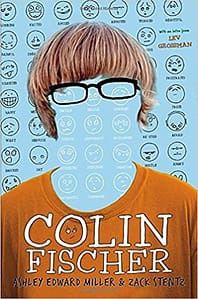 Ashley Edward Miller and Zack Stentz wrote Colin Fischer, a book I found lonesome at the library. In it, they tell the story of a boy called, surprise, Colin Fischer. The story is supposed to be a mystery where Collin tries to unfold who dropped a gun in the middle of some room in the school.
Ashley Edward Miller and Zack Stentz wrote Colin Fischer, a book I found lonesome at the library. In it, they tell the story of a boy called, surprise, Colin Fischer. The story is supposed to be a mystery where Collin tries to unfold who dropped a gun in the middle of some room in the school.
Wait a Minute:
The story made me feel very uncomfortable, because Colin’s mental illness (autism) was alienating for him. I didn’t know much about autism, but there’s a part of me that is unsure of how the book presents the illness.
Spock and Data as role models for Colin. This is the second time I see this so-called “connection” in a book about a disabled character. Is this the only bit of representation out there, though? Why can’t characters relate to other people? Other heroes?
Colin is presented as a detective, but, I feel like this is an escape route rather than showing a life with disability. He is not shown to have any interests, or any friends, or any relationships that extend beyond care-giving. Supposedly, he “thinks a lot,” but the authors do not present any examples of what these thoughts may be. No motivations are associated with him either. All he is focused on is solving this so-called mystery, and it feels disrespectful.
Just a quick Google search shows many accomplished people exist, and they happen to have autism. They do more than float or obsess over the stories of others. And, the fact that this is a young adult or middle grade book makes this portrayal even more damaging.
Ill-Prepared Schools
One of the aspects of the story that rang a disturbing note for me was the school Colin attended. He is bullied and mistreated by teachers, who somehow do not foster a comfortable environment. I am not sure what school allows students to let their phones ring. And, I am also not so sure any teen would drop hundreds of dollars to make a disabled student uncomfortable.
Even more strange was the head-mistress who just…tells Colin he won’t get special treatment for his disability, which is bizarre. I recall having papers telling teachers what I’d need to cope in the classroom as a disabled student (and this was college, I can’t even imagine it being any different in high school).
Furthermore, from what I know, educators are exposed to various information regarding students and how to help them integrate into high school. When I was a tutor, we had day-long seminars and training sessions to, you know, be aware.
Family Dynamics
Sure, maybe his school was not well prepared for disabled students, but it baffles me that his little brother calls him the r word repeatedly. This intense hatred is never further developed or resolved. Reading this kind of relationships feels isolating to me as a disabled woman. Should my family see me as a burden because my brain is wired differently? Would I not be able to have satisfying relationships with others? While I think it is fine to show that some characters feel this way, I wish the authors somehow challenged the notion through Colin, through his insight and intelligence.
Overall
Kind of a cringe worthy experience with this book. I think this is an example of representation not being fulfilling at all. While it is okay to show the problems a disabled person faces, I think its still crucial to show that they are problems. Rather than just facts.
Your Turn:
What is an inaccurate portrayal of a disability that you have encountered? Why and how was it inaccurate? Share your thoughts in comments.
Amazing review with so many good points made!
Autism is sometimes classified as a mental illness, and sometimes (more often) classified as a learning disability. Likewise, it’s often not classified as a mental illness, and not classified as a learning disability. A lot of people with autism prefer the term neuro-diverse, non-neuro-typical, or neuro-atypical. 🙂
All good information to know, Cee Arr! I wish the authors fleshed out Colin’s character some more.